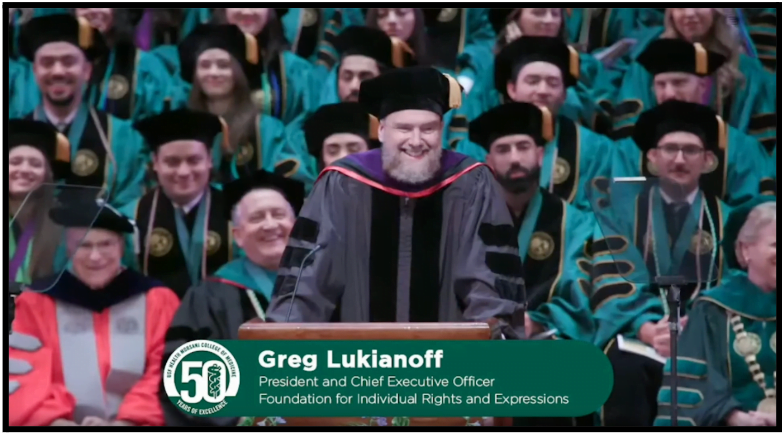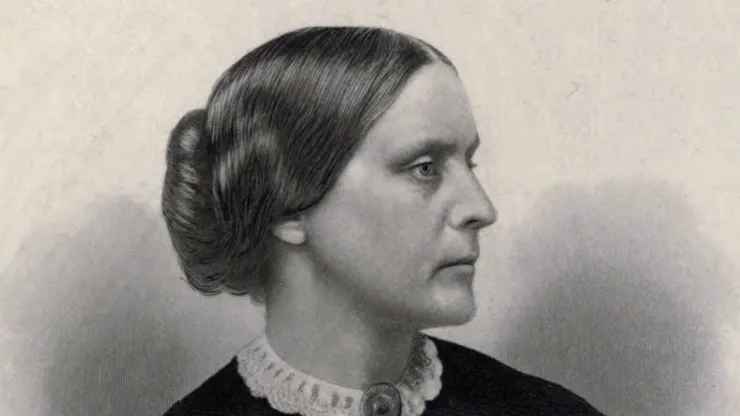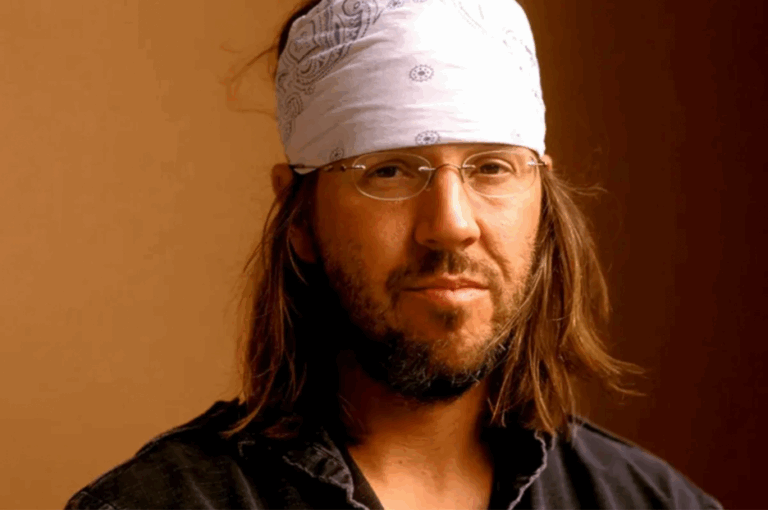Talking Big Ideas.
“Be sincere. Be brief. Be seated.”
~ Franklin D. Roosevelt
Greg Lukianoff delivered an excellent commencement speech last week.
I’m embedding the video and sharing my thoughts on it. I’ve also republished the script at the end (it’s under 800 words). I highly encourage you to enjoy the full speech.
For quick background: Greg is an influential thought leader and co-author of The Canceling of the American Mind as well as co-author of the bestselling classic The Coddling of the American Mind.
He’s president of the Foundation for Individual Rights and Expression (FIRE), the nation’s premier defender of free thought and free speech, and he runs the popular Substack The Eternally Radical Idea.
I’m honored to call Greg a friend and client, and had the privilege to work with him on this speech. He published a critique of himself that’s worth reading. I’ll highlight five things he did well that we can emulate.
But first, please do watch the speech:
1. A Clear Big Idea
The best speeches have one simple core insight that gets driven home.
As Winston Churchill’s public speaking coach advised: “Make one simple bold point and keep pounding on it with many illustrations and examples.” Churchill would later add: “Don’t try to be subtle or clever. Use a pile driver. Hit the point once. Then come back and hit it again. Then hit it a third time—a tremendous whack.”
Greg does this. He says “certainty” nine times and “mind” 12 times. He effectively blends personal anecdotes and cultural references to drive home his central message, making it easy for the audience to grasp. Everyone walks away with some variation of “Certainty is the mind killer” in their heads.
2. Audience Focus
The opening sentence should grab the audience’s attention.
Greg’s is fantastic: “I am in awe of you.” Six words, no word more than three letters, all fully focused on the audience. This immediate audience hook reminds me of Nilofer Merchant’s powerful opening in her TED talk: “What you’re doing right now . . . at this very moment . . . is killing you.”
The audience remains the focus throughout Greg’s talk. He reiterates his admiration, sharing emotional vignettes about his doctor sister, referencing pop culture, and showing he understands the audience’s interests and experiences.
3. Solid Structure
Speeches should have a flow that makes them easy and compelling to follow.
Greg moves from his audience-focused opening into a compelling story that sets the stage for the rest of the talk. He reveals his theme and supports it with clear examples that build on each other, and concludes with a motivating call to action that again reinforces his theme. The natural flow ensures his audience can easily stay engaged and retain the message.
4. Illustrative Examples
Greg’s stories are vivid with clear morals and his analogies add levity and humor.
One of the things I admire about Greg is how authentically himself he is. He allows his personality to shine in this speech, which is full of his ideas and emotions – from admiration to amusement, from surprise to self-deprecation, from introspection to inspiration. Greg has a huge heart and the audience feels it.
The leitmotif of his sister’s admirable character is woven throughout and sticks with you. His language is clear and concise, his comparisons compelling: “I lost a case . . . she lost a mother.” Greg makes complex ideas accessible and helps to hold his audience’s attention while driving his message home.

5. Stage Presence
Notice how much easier it is to listen to Greg than the man who introduces him. Both are well-spoken, but Greg’s delivery is more pleasing to the ear.
His voice is confident and engaging. He feels fully present with the audience and willing to take his time. Greg pauses frequently and punches certain words and phrases, a vocal tempo well suited to the occasion and room. He uses facial expressions to complement his words.
Kim Hemsley, a coach at the Ewing School and a former professional actress, adds:
Lovely moments of humor, smiles, variety in delivery, and melody.
The audience (behind) is still, always a sign of a good speech. I often sit at the back of rooms for speeches and watch the audience as well as the speaker. When the audience collectively starts to shuffle (it happens, it’s unbelievable, they start doing it together), it’s a sign the speaker has lost his audience. Greg keeps the audience in his grasp the whole time.
Overall, this is a beautiful speech. Short, concise, deeply moving, yet with a very clear message, while also making the audience feel important. “In awe of you” is not a phrase one hears often.
And if he was talking to me, after years of training, I would feel really looked at and appreciated. It made me feel that Greg was ‘feeling’ with me.
Good speeches transfer ideas as well as feelings. They cannot be handed off to someone else to deliver; they are filled with the speaker’s own stories and soul – and uniquely tailored to the audience.
Which is exactly how Greg crafted this speech.
***
Certainty is the Mind Killer
Greg Lukianoff
09 MAY 2024
I am in awe of you.
I mean that.
My sister went to school on a Navy scholarship and eventually became a surgeon. The sheer amount of dedication, stress, heartbreak, and courage it takes to be a doctor is something that I fear our society underappreciates today.
I remember calling her one day. We were in court and lost a case. She was in surgery and lost a mother.
My sister is a stronger, braver person than I could ever hope to be. But strength and bravery are the minimal job requirements of being a doctor.
And that is why everyone should be in awe of you.
I’m here today to talk to you, however, about something that is surely on your mind at this moment.
Dune 2.
OK, maybe on one of your minds, but I think y’all know who that person in your class is.
In my class that was me.
There is a famous line from the movie: “fear is the mind killer.”
OK, fine, every sci-fi fan is a pedant, and I’m sure he’s muttering to himself, “that was Dune one.”
Fair enough.
I love the idea that “fear is the mind killer”, but I’ve never really agreed with it. Fear can help focus the mind, makes us more aware of small details, it slows down time.
You know, like the moment a pedantic sci-fi nerd realizes he has to give a talk in front of 200 doctors?
I can tell you that panic will stick with you.
But do you know what the actual mind killer is?
Certainty.
Certainty is the true mind-killer.
When you are certain, you give yourself permission to turn off your mind, maybe go back to daydreaming about life after medical school, or, you know, giant spice spewing sand worms.
So, certainty is the mind-killer, and unfortunately, we live in certain times. I know, it’s usually said that we live in “uncertain times” but that’s not the case today.
The greatest problems of the last century, in fact, have arrived from certainty, particularly moral certainty. Believing that we or our group are possessors of moral truth, and that knowledge is not a process of testing and retesting, but something already possessed by people in our group.
So why shouldn’t you let certainty kill your mind?
Because it’s a painfully dull, colorless, rigid way to live. The joy and awe of life comes from looking up at a night sky and saying, “I could never begin to comprehend your vastness” rather than, “whatever, I TOTALLY get all that.”
And how can you keep certainty from killing your mind and deadening your life?
Well, that’s the good news.
As doctors you are scientists and you know that the greatest discovery in human history was the discovery of our own ignorance. Of how little we really knew and how we had to test and work to understand even our own intuitions.
It makes sense that heavier objects would fall faster than light ones, or that time and space couldn’t possibly be different at different speeds or around massive objects.
But our common sense was just plain wrong.
As doctors, you have regular access to the greatest cure for certainty ever invented. Listening to people, particularly people very different from you. Indeed, as my sister can attest, listening can even save a life.
She told me a story about a patient of hers who had a surprising fall. Even though all the symptoms pointed in one, not particularly serious direction, after talking to him for a long time and just getting to know him, some alarm bells went off.
She had him tested for a rare kind of cancer. She told me it’s the kind of cancer you usually find out about right before being told how many weeks you have left to live.
Thankfully, she caught it in time. My sister’s curiosity saved his life.
And the curiosity that makes you better at getting to know people is not just good for your practice, it’s good for our society.
Try to exercise that same curiosity about where people are really coming from in your daily life. Our society needs a great deal more of it, as we are increasingly bad guessers at what our fellow citizens actually think.
And if we all exercise curiosity, if we all put our judgments to one side to listen, we have a chance of overcoming at least some of our divisions.
Because while certainty is the mind-killer, listening to people is the cure. And I hope you all stay in awe of each other and in awe of the potential opened up by genuine curiosity.
Thank you.




